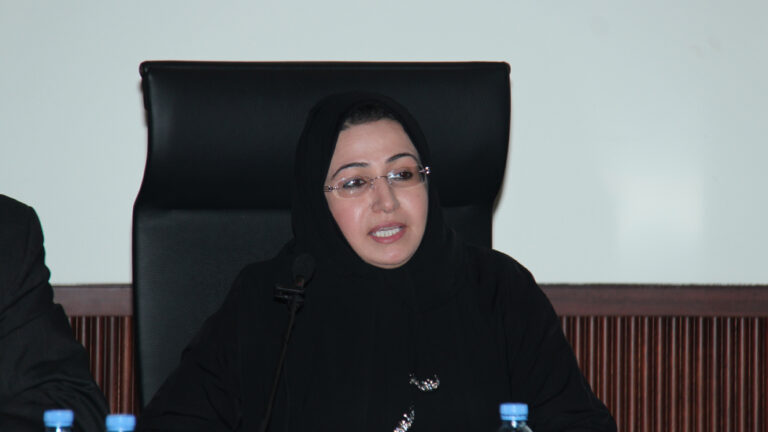Dialogue Series, Distingushed Lectures, Race & Society, Regional Studies
Maha Al-Hendawi Lectures on Inclusive Education in the Gulf

Maha Al-Hendawi, the inaugural CIRS Qatar University Fellow for 2012-2013 and Assistant Professor of Special Education in the College of Education at Qatar University, delivered a CIRSFocused Discussion on “Policy Borrowing in Education: the Example of Inclusive Education in the Gulf” on February 19, 2013. Al-Hendawi began the lecture by noting that her interest in the topic came from her own experience as a graduate from a US university who returned to Qatar thinking that she would implement some of the policies and procedures she had learnt and experience whilst studying abroad.
Al-Hendawi explained that she was initially enthusiastic about introducing certain US-based policies upon her return to Qatar. However, the reality on the ground proved otherwise, and she began experiencing a fundamental problem with “policy borrowing.” Al-Hendawi’s direct involvement with local schools, as well as with the Supreme Education Council, gave her greater insight into the specific challenges of the local educational environment that policy borrowing might not be able to solve, and that may even lead to a whole set of new and unforeseen challenges. Al-Hendawi noticed that certain policies were not as successful in Qatar as they were in the United States. She is currently working on investigating why these challenges exist and what she could do to help formulate future policy directions. Al-Hendawi said, “I basically chose one of the most important policies in Special Education, if not the most important policy in Special Education, that is, ‘inclusive education,” as a case study, which followed the research path set by renowned scholars in the field.
The general definition of “inclusive education” is when students with disabilities are included within the general education system and given access to a general education curriculum. There are many different approaches to inclusive education worldwide, where some models advise that students with only mild disabilities can be included. UNESCO, however, advocates for “full inclusion” and an open school system where any student with disabilities, no matter the degree, is able to access the general school system. This lack of consensus on what constitutes “inclusive education” presents a number of challenges. For example, the Qatari school system adopted both modified inclusion and full inclusion at different times and with different results.
“The main reasons for borrowing policy, or borrowing the policy of inclusive education, are globalization and international pressure,” Al-Hendawi said. It is important to put policy borrowing in its proper context. “Here in the Gulf, when the policy of inclusive education came, it came with education reform,” and a reorganization of the entire school system and curriculum. Al-Hendawi argued that “timing is really important because it actually came post-9/11,” when the West began questioning the Arab educational system in general and became directly involved in its overhaul. This was a highly contentious issue that was debated in local media outlets all over the Gulf.
“When the policy of inclusion started in the West, it came out of the human rights movements, and it came out of the ideology of social justice, equity, equality, so it was actually a bottom-top type of decision” that grew organically out of public demands. In the Gulf states, however, these policy decisions are being imposed from the top-down. In this regard, even though the policies are commendable and show results in their countries of origin, they have not had enough time to filter through the social structures of Gulf countries.
In conclusion, Al-Hendawi warned that policy borrowing is a problem when it is implemented as a “quick fix” to address an immediate issue. This is further exacerbated when policies do not take into account the specific social, cultural, and political environments that may not always be compatible with the implementation and aims of the policy. In short, careful and constructive policy borrowing must be implemented in a way that takes into account local contexts in order for it to become internalized by the adoptive country.
Maha Al-Hendawi received her Ph.D. in Special Education and Disability Leadership from Virginia Commonwealth University. Her research interests include educational policies and reform initiatives in the region; academic interventions for children and youth with special needs and those who are at-risk; and quality preparation and training programs for educators. She has published in the area of special education and has been a guest speaker in various events and activities.
In order to enhance local research productivity and build upon its established collegial relationship with Qatar University, CIRS launched an annual fellowship to be awarded to a member of Qatar University’s faculty. Maha Al-Hendawi was selected as the 2012-2013 CIRS QU fellow. The fellowship will support Al-Hendawi in pursuing original research projects, with the aim of publishing research outcomes.
Article by Suzi Mirgani, Manager and Editor for CIRS Publications